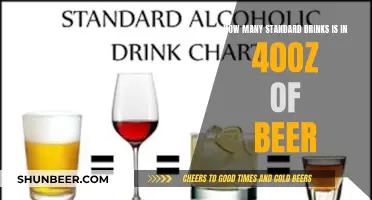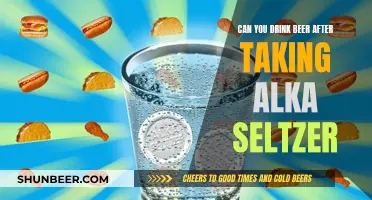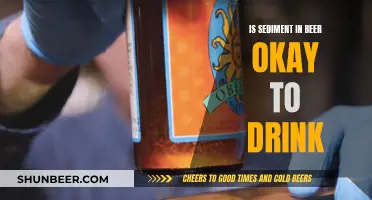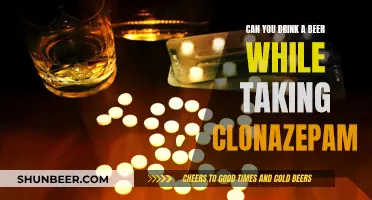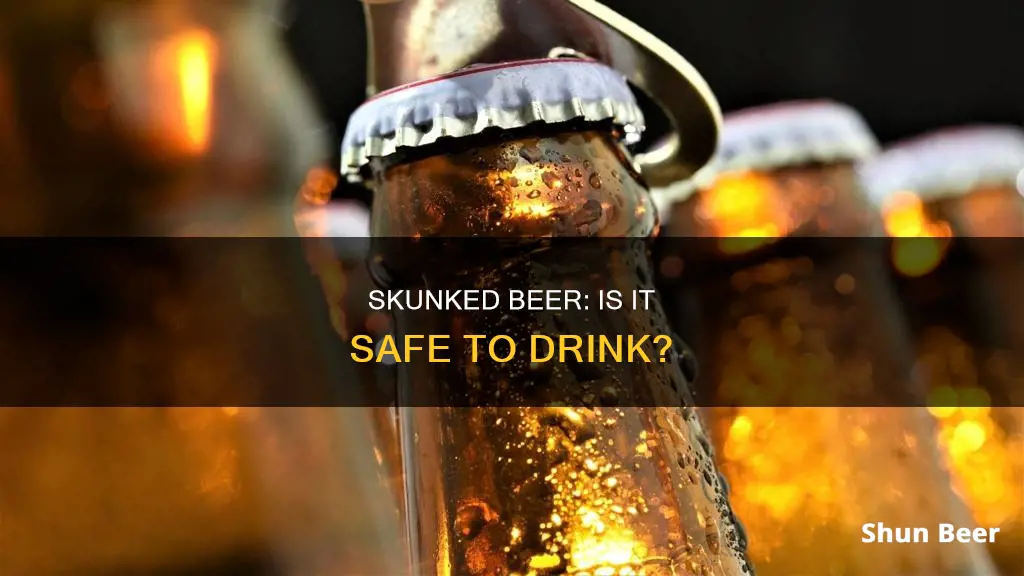
Skunked beer is a well-known off-flavour of beer that occurs when bottled beer is exposed to ultraviolet or artificial light, resulting in a sulfuric taste and smell reminiscent of a skunk's spray. Despite being unappetizing, drinking skunked beer is not unsafe and will not make you sick. The only difference between skunked and regular beer is in its taste and smell, with the former often described as tasting like burnt rubber or wet cardboard. The chemical reaction that causes skunked beer only affects the profile of the beer and not its safety or alcohol content. Therefore, while it may be unpleasant, it is okay to drink skunked beer.
| Characteristics | Values |
|---|---|
| What is skunked beer? | Beer that has undergone a chemical reaction due to exposure to light, resulting in a skunk-like taste and smell. |
| What causes it? | Exposure to ultraviolet or artificial light, which causes a reaction in the hops (alpha acids) and sulphur content in the beer. |
| How to identify it? | Skunked beer has a distinct smell, such as burnt rubber, cat musk, or wet cardboard. It may also taste flat and lack carbonation. |
| Is it safe to drink? | Yes, drinking skunked beer is not unsafe. It may taste unpleasant, but it will not make you sick unless consumed in excessive quantities. |
| How to prevent it? | Store beer in dark and cool places, avoid clear glass bottles, and opt for cans or brown bottles that offer better protection against light. |
What You'll Learn

What does skunked beer taste like?
Skunked beer is caused by a chemical reaction that occurs when beer is exposed to ultraviolet or artificial light. This process is called "skunking", and it results in the beer taking on a strong skunk-like taste and smell.
The taste and smell of skunked beer are often described as reminiscent of a skunk's spray, with notes of burnt rubber, musty basement, or wet cardboard. Some people also describe the taste as bitter and a bit sulfuric. The chemical compound responsible for this unpleasant flavour is called 3-methyl-2-butene-1-thiol (MBT), which is produced when the alpha acids in hops break down and react with the sulfur content in the beer.
While the taste and smell of skunked beer can be quite off-putting, it is not unsafe to drink. The chemical reaction that occurs during skunking only affects the profile of the beer and not its safety. However, drinking multiple skunked beers in a short period may lead to feelings of illness due to inebriation and intoxication.
It's important to note that the level of skunkiness can vary depending on the type of beer and the packaging it comes in. Beers packaged in green or clear bottles are more likely to be skunked as they offer less protection from light exposure. On the other hand, brown bottles and aluminium cans are better at blocking out ultraviolet and artificial light, reducing the chances of skunking.
Drinking Beer on Rhode Island's Beaches: What's Allowed?
You may want to see also

Is it safe to drink skunked beer?
Skunked beer is a well-known off-flavour of beer that occurs when bottled beer is exposed to ultraviolet or artificial light. The beer then undergoes a chemical reaction, producing a compound known as 3-methyl-2-butene-1-thiol (MBT), which is chemically similar to the secretion of a skunk's spray. This process is known as light-strike and results in an unpleasant taste and smell.
Despite the chemical reaction, it is safe to drink skunked beer. The reaction only affects the profile of the beer and not its safety. You will not get sick from drinking a single skunky beer. However, drinking multiple skunked beers in a short period may make you ill, but this is due to inebriation and intoxication, not the skunking.
Skunked beer is also still alcoholic, with the alcohol content remaining completely unchanged by the light-strike reaction. The only difference between skunked and regular beer is the smell and taste.
Skunked beer is more common in certain types of beer bottles, as light exposure is the main cause. UV rays can only reach beer through glass bottles, so beer in aluminium cans will not be affected. Brown bottles are best at blocking out light, followed by green glass, which can only block light under 400nm in wavelength. Clear glass bottles are the least effective at blocking UV rays, but some brewers use tetra-hops, a form of hop extract that is resistant to light, to prevent skunking.
To avoid skunked beer, choose cans or brown bottles, and store your beer in a dark, cool place, like a basement or fridge.
DayQuil and Beer: A Safe Mix?
You may want to see also

Can you get sick from drinking skunked beer?
Skunked beer is a result of a chemical reaction that occurs when bottled beer is exposed to ultraviolet or artificial light. This exposure causes the beer to take on a taste and smell that is reminiscent of a skunk's spray. While it may be unpleasant, drinking skunked beer will not make you sick. The chemical reaction only affects the profile of the beer and not its safety.
The process of skunking involves the breakdown of alpha acids, also known as isohumulones, which are present in the hops used to make beer. These acids are highly sensitive to light and will quickly break down in the presence of sunlight or bright fluorescent light. When this happens, they react with the sulfur content in the beer, producing a compound called 3-methyl-2-butene-1-thiol (MBT). MBT is chemically similar to the substance that gives a skunk's secretions its potent and distinctive odour.
Humans are extremely sensitive to MBT and can detect even trace amounts in beer. This is why skunked beer is often characterised by its strong and unpleasant smell and taste. However, it is important to note that the chemical reaction between light and the alpha acids does not impact the alcohol content of the beer. The amount of alcohol in a beer is determined during fermentation and is not affected by exposure to light.
While drinking skunked beer will not make you sick, it is worth mentioning that excessive consumption of any alcoholic beverage can lead to negative health consequences. Additionally, if the beer has been contaminated or infected for reasons other than light exposure, there may be potential health risks associated with consumption.
To avoid skunked beer, it is recommended to choose canned beer or beer packaged in brown or green glass bottles, as these provide better protection against light exposure. Storing beer in a dark, cool place, such as a basement or fridge, can also help prevent skunking.
Beer and Potassium: Is There a Link?
You may want to see also

Will the alcohol content of a beer change if it's skunked?
Skunked beer is bottled beer that has undergone a chemical reaction due to exposure to ultraviolet or artificial light. The main ingredients used in making beer are hops, yeast, grain, and water. Hops contain alpha acids, which are very sensitive to light. When these acids break down, they react with the sulfur content in the beer. This produces a compound known as 3-methyl-2-butene-1-thiol (MBT), which smells strikingly similar to a skunk's secretion.
The alcohol content of a beer remains completely unchanged by the light-strike reaction. The chemical reaction only affects the profile of the beer. The beer is the same strength and its ABV remains the same. So, if you have a beer that has skunked, you can still drink it, but it will taste bitter and a bit sulfuric.
To avoid skunked beer, you can make some minor adjustments:
- Consider buying canned beer instead of bottled beer.
- If you buy bottles, make sure they are not displayed in direct sunlight.
- Store the beer in a dark, cold place or the fridge as soon as possible.
- Use a cooler with a lid if you're drinking outside.
- Prevent direct sunlight by storing the beer in a basement or another dark and cool place.
Antabuse and Alcohol: Why Drinking Beer is Risky
You may want to see also

How to prevent skunked beer
Skunked beer is bottled beer that has undergone a chemical reaction due to exposure to ultraviolet or artificial light. The chemical reaction causes the beer to taste and smell like a skunk's spray. This reaction can occur within seconds of the beer being exposed to light.
To prevent beer from skunking, you can make a few adjustments:
- Choose cans over bottles: Aluminum cans effectively block out light, reducing the likelihood of skunking.
- Opt for darker bottles: If you prefer bottled beer, choose brown or green glass bottles. These shades slow down the skunking process by blocking out light under a certain wavelength. Brown bottles offer better protection, blocking light under 500nm, while green glass blocks light under 400nm.
- Avoid direct sunlight: Whether you're purchasing or storing beer, keep it out of direct sunlight. Store beer in a dark, cold place, such as a basement or refrigerator.
- Use a cooler with a lid: If you're drinking outdoors, keep your beer in a cooler with a lid to prevent exposure to sunlight.
- Avoid fluorescent lighting: Even fluorescent lighting at home can contain wavelengths that interfere with your beer. Keep your beer away from direct exposure to fluorescent lights.
Drinking Beer While Driving in Pennsylvania: What's Allowed?
You may want to see also
Frequently asked questions
Yes, drinking a skunked beer is not unsafe. Although it might not taste or smell great, the chemical reaction that happens when beer is exposed to light does not make it unsafe to drink.
Skunked beer has a very distinct smell, similar to burnt rubber, a musty basement, or wet cardboard. It also tastes flat and lacks the crispiness of a fully carbonated beer.
To prevent your beer from getting skunked, avoid exposing it to direct sunlight or artificial light. Store it in a dark, cool place, or in the fridge. If you're drinking outside, use a cooler with a lid.



